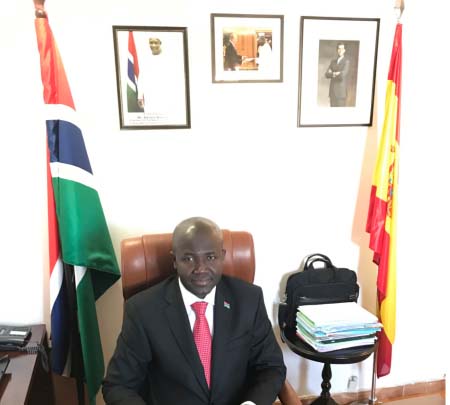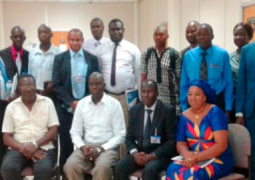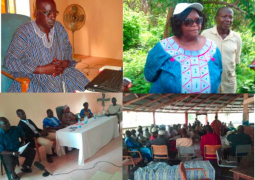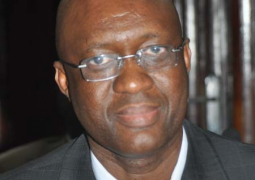
WHAT
SORT OF WORK DOES THE EMBASSY DO ON DAILY BASIS?
The embassy is the main institution representing the Republic of The Gambia in the Kingdom Spain, the Republic of Italy, the Hellenic Republic (Greece), the Republic of Malta and the United Nations Agencies based in Rome (FAO, IFAD, and WFP) as well as the UNWTO in Madrid. Hence, one of the main important functions of the embassy is the promotion and strengthening of bilateral relations between The Gambia and the countries and organisations of the Mission’s jurisdiction, building good image for The Gambia and to attend to the welfare and consular needs of Gambians resident within the jurisdiction of the embassy.
Also
of importance is the promotion of trade, socio-economic, cultural ties as well
as facilitating visas and providing relevant information to potential investors
and visitors to The Gambia.
Therefore,
the daily activities of the embassy staff includes promoting The Gambia,
representation functions, assisting Gambians to acquire Gambian documents e.g.
passports, consular identity cards, emergency travel certificates, tax
identification numbers, facilitating translation and authentication of Gambian
documents, assisting Gambians to open bank accounts in The Gambia, transmitting
official correspondences, attending to enquiries and handling other routine
administrative matters.
The
embassy, in addition, offers protocol and visa assistance services to Gambian
officials and students travelling to the countries under our jurisdiction at
the Spanish Consulate in Dakar, Senegal and serves as the reference point for
information about The Gambia for organisations, potential investors, visitors,
private individuals, etc.
Crucially, the embassy also provides guidance and counselling service, welfare assistance, information to Gambians on issues affecting their welfare such as family, immigration, financial matters, etc. as well as share with the community their times of joy and sorrow by sending representatives from the embassy.
In
fulfilment of the duties highlighted above, the embassy regularly attends
meetings and programmes organised by our hosts, the international
organisations/agencies to which it is accredited to as well as organise
meetings and programmes of its own. Receives and guide potential investors on key investment areas, how to
register their business, link them up with relevant authorities in The Gambia
and inform them about the possibilities and concessions that they can benefit
from as investors. The embassy also responds to queries and enquiries from the
public and institutions within its coverage.
However, it should be pointed out that the work of the embassy is not limited to the above since we are constantly faced with new challenges hence our work calls for versatility and dexterity.
HOW MANY GAMBIANS ARE REGISTERED IN SPAIN AND OTHER COUNTRIES UNDER YOUR JURISDICTION?
The registration of Gambians in the various countries under the jurisdiction of the Gambia Embassy in Madrid is ongoing. The Kingdom of Spain has one of the highest numbers, if not the highest, of Gambians living in any one country in Europe. Officially, the embassy has a total of 19,319 registered Gambians. The total number registered at the Consulates in Portugal is 239, Greece 98, Italy 625. It is important to point out that since not all Gambians within the mission’s jurisdiction are registered with the embassy or its consulates, the embassy finds it difficult to determine the exact number of Gambians living within its jurisdiction. However, this notwithstanding, going by the number of registered Gambians and the figures relating to undocumented Gambians that crossed the Mediterranean Sea to Italy during the last few years, the total number of Gambians under the embassy’s jurisdiction would be more than 50,000.
WHAT ARE THE SUCCESS AND SETBACKS AMONG GAMBIANS? ARE THERE STORIES OF ICONS, ROLE MODELS AMONG GAMBIAN MIGRANTS IN SPAIN?
A
large number of Gambian migrants especially those who arrived in Spain from the
1970s are mainly agricultural and industrial workers most of whom have become
successful in one way or the other.
Generally, a lot of them have done very well for themselves both in
Spain and in The Gambia over the years.
It is a known fact that the majority of Gambians who came to Spain did
it through irregular migration. But thank God most of them were able to
regularise their status and are legally resident in the country and a sizeable
number of them have acquired Spanish nationality. Therefore, for reasons of
fairness and impartiality, I would not like to single out individuals as icons
or role models but Gambians both collectively under the banner of their various
associations or individually have integrated very well into the Spanish society
and there are a lot of role models among them worthy of emulation in terms of
integrity, hard work, patriotism, cultural and social affinity to their
families and country of origin.
It
is also evident that because of their successes, the amount of Diaspora
remittances from Gambians in Spain is among the highest for The Gambia. A lot
of them continue to make personal investments in properties and other assets
and today, a number of them have established successful businesses doing
retail, telecommunication, travel agents as well as money transfers both in The
Gambia and in Spain thereby creating jobs and wealth for themselves, their
employees and the society as a whole. The successes registered by Gambians in Spain enables them to continue
to contribute positively to the development of the Spanish society by being
business owners, employees, tax payers, etc.
Furthermore,
Gambians in Spain are always praised by the various Spanish authorities for
being disciplined, peaceful and hardworking and this made them worthy
ambassadors of The Gambia in the Kingdom of Spain which I am really proud of.
Another
important success of Gambians in Spain is their proactive nature in seeking for
funding and partnership for community-based projects in The Gambia especially
in the areas of health, agriculture, etc. With this, they continue to
complement the development efforts of the government by contributing greatly to
the development of their villages and towns in The Gambia as well as catering
for the daily needs of their families, relatives and friends. It must also important to point out that most
Gambians in Spain are working in the informal sector. However, some parents are now very conscious
about the importance of educating their children and are even sponsoring them
up to university level. These are indeed
role models in the communities they come from and we continue to encourage all
Gambians to give their children sound education because with a good education
background, opportunities are unlimited.
What
I will refer to as setback has to do with the lack of adequate amount of
investment in education by the community in the past. Since Gambians are in their second generation
in Spain, the level of their participation and influence in the Spanish society
could have been more than what it is today if a lot of them especially those
born in Spain are well educated. This
continues to be a major concern for the embassy and we have been sensitising
Gambians about it. The good news is that the trend is changing with a number of
young Gambians in Spain now attending universities and colleges and a lot of
them also developing the interest to do so as well.
Another major difficulty/setback for the community is the economic crisis that affected the Kingdom of Spain in the last couple of years. This led to difficulty in getting residence permits, lot of unemployment and loss of earnings hence economic hardship for the families with its attendant associated problems for the community. Spain however, is recovering economically and it is hoped that the recovery will soon impact positively on the living condition of common people including the Gambian community.
HOW DO GAMBIAN MIGRANTS FEEL ABOUT THE CHANGE IN THE GAMBIA?
The
Gambian community like many Gambians in the Diaspora were indeed part and
parcel of the process that brought about the change that has given every
Gambian the freedom that we are enjoying today.
The community in Spain was very active on the social media during the
period leading to the elections and they campaigned a lot by convincing their
families and friends in The Gambia to vote for change. Importantly also, they contributed
financially towards the entire process. The Members of the Gambia Democracy
Movement Spain chapter (composed mainly of UDP, NRP and PDOIS supporters) were
very active especially from April 2016 to the presidential election of 1st
December 2016.
In a nutshell, Gambians in Spain served as change agents during the struggle and are extremely happy that the change that they fought for has been realised. I have no doubt that they will continue to support the government to the best of their abilities.
GENERALLY, HOW GOOD IS THE RELATIONS BETWEEN SPAIN AND THE GAMBIA LIKE?
The
relationship between The Gambia and Spain is good and can be seen from the
political, economic, social and cultural ties and exchanges existing between
the two.
Politically,
the two countries have been cooperating very well at the international level on
issues of mutual interest and concern. It could be recalled that the Kingdom of
Spain was the president of the United Nations Security Council for the month of
December 2016 and we have all seen how the president and other members of the
Security Council stood by the Gambian people to help in upholding the will of
the people and resolve the political impasse.
The
government and people of Spain economically and financially, prior to the
economic crisis provided a number of development assistance and support to The
Gambia during the Spanish III Development Master Plan and before, such as the
re-construction of The Gambia Tourism and Hospitality Institute (opened in
2013), GAM-Jobs Project under the Trade Ministry, cooperation with the Ministry
of the Interior, etc.
The
government of Spain through the Democratic Governance Thematic Trust Fund also
provided the sum of US$1.45 million to the UNDP regional bureau to fund The
Gambia government’s Civil Service Reform Project under the Personnel Management
Office, Office of the President, between 2007 and 2010. This is in addition to the institutional
support rendered to the National Training Authority in terms of refurbishing
some major training centres across the country such as the GTTI, Chamen
Training Institute, etc.
In
addition, a number of regional governments, institutions, nationals and
Gambians based in Spain have also been supporting and sponsoring community
based projects in The Gambia for example Fons Catalan, Women for Africa
Foundation, Nutrition Without Borders, etc. and above all Spain, Italy,
Portugal, Malta and Greece continues to be major sources of Diaspora remittances.
In
terms of trade and investment, the Kingdom of Spain is among The Gambia’s main
trading partners in Europe. Currently an
increasing number of both Spaniards and Gambians in Spain continue to express
interest to partner and do business in The Gambia. This is evident from the
number of those registering businesses in The Gambia and in the number of those
bidding for major contracts and/or the use of Spanish experts in contracts such
as the Yeli Tenda/Bamba Tenda Bridge, the Airport Expansion, etc.
At
the moment, there is a proposal to have an Investment Protection Agreement
ratified between the two countries and this is expected to add more impetus to
the growth of trade and investment between the two.
In
the area of tourism, the Spanish market by the start of 2014 is among the top
seven traditional source markets for Gambian tourism as per the data from the
Gambia Tourism Board. This
notwithstanding the last few years have witnessed a lot of efforts by both the
embassy and the Gambia Tourism Board to market Gambian tourism within the
mission’s jurisdiction and the momentum generated which will be sustained and
encouraged.
It
is also important to point out that as a result of the increase in tourism,
business, family contacts, etc, the Kingdom of Spain today operates and
maintains two direct flights to The Gambia per week.
It
is also the case that there exist a lot of goodwill for The Gambia among
Gambians and Spaniards in Spain and a lot of promotional efforts have been done
within the past three years to promote, better position and make The Gambia
widely known in Spain and as a result of the continuous awareness creation, The
Gambia today is more widely known in Spain than it was few years ago.
Socially
and culturally, The Gambia and Spain and the other countries within the
mission’s coverage are closely linked by the presence of many Gambians in these
countries, large number of intermarriages, family ties, etc. For example,
Gambians in Spain are now in their second generation and the two countries will
continue to be socially and culturally inter-link forever.
To
conclude, therefore, with thousands of Gambians and Gambian/Spanish living in
Spain with family ties in The Gambia and with the increase in the number of
Spaniards now living and/or wanting to do business or visit The Gambia, the
governments of the two countries should continually work together on issues of
mutual interest and concern. An important leap forward in this regard, will be
for the government of Spain to reciprocate and upgrade its Mission in The
Gambia to a full fledge Embassy or at least staff it appropriately to be able
to handle all Consular matters. This will further strengthened the relationship
between the two countries and help to address one of the most difficult constraints
of the Gambian community and Gambian/Spaniards in Spain.
QUESTION:
HOW GOOD IS YOUR SPANISH?
Answer:
Small Small
THANK
YOU FOR YOUR COOPERATION AND HARD WORK
Thank
you too for the opportunity
By: Saikou Ceesay
Communications
officer
Ministry
of Foreign Affairs, International Cooperation and Gambians Abroad





